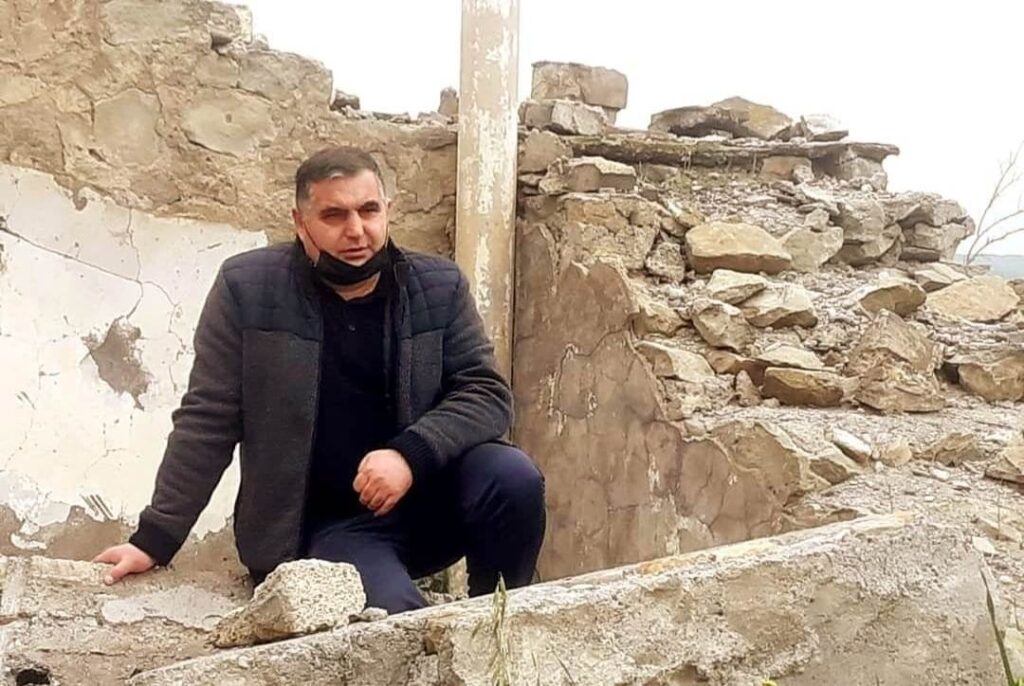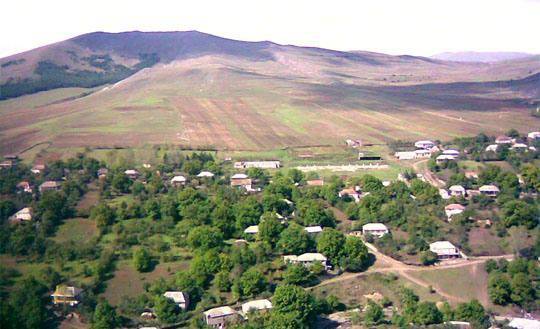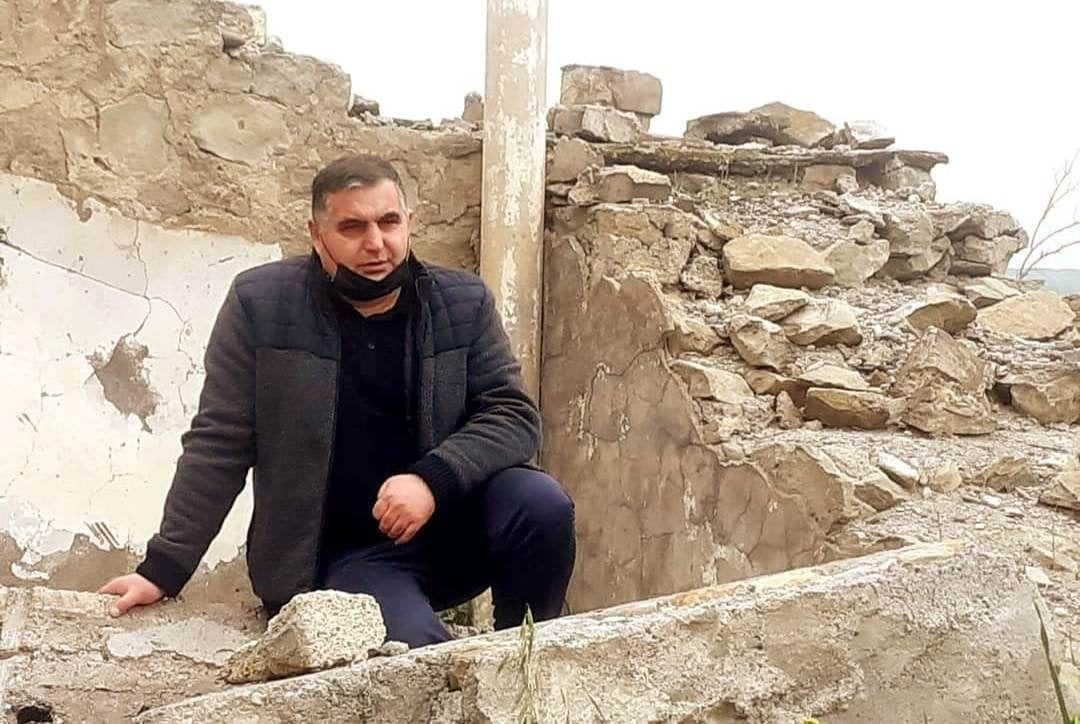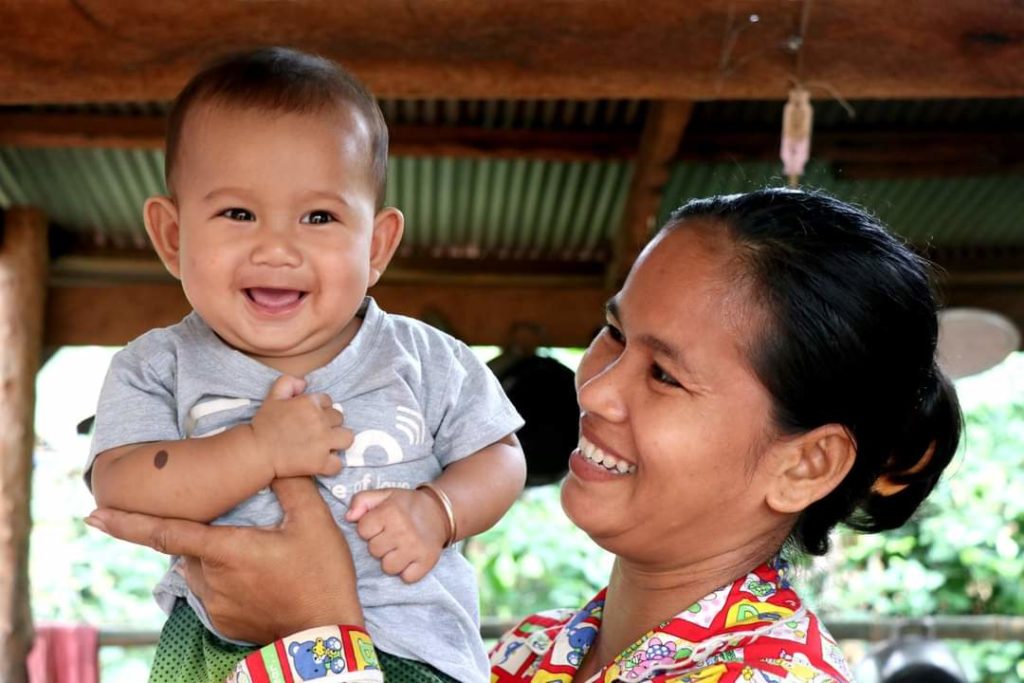By Azer HASRET
This is my friend and colleague, sitting on the remnants of the wall. He is a well-known journalist and a very active citizen.
For those who has no information about this person and a place where he is sitting, this is just a photo.
But for me and for all those who know this person and the place where he is sitting on the remnants of once a house, this is a tragedy. Very deep human tragedy.

A person on the photo is Seymur Verdizade, very famous Azerbaijani journalist. Studied in Turkey and worked for very famous media outlets of Azerbaijan for more than 20 years. Nowadays he is an editor-in-chief of comparatively new media unit Yeni Sabah.
Seymur was born in Karabakh, Azerbaijan. To be more clear, he grew up in Soltanli village of Jabrayil region of Azerbaijan which is located in the South part of the Republic of Azerbaijan near the border with Iran.
While asked about his memories he told me that left the village in 1993, before the occupation by Armenia and during the next 27 years never could return back. As Armenia occupied Jabrayil regional center – city of Jabrayil as well on August 23, 1993 none of its residents were able to get back. All of them were ethnically cleansed and some were even eliminated through killing.
“My village – Soltanli was occupied on October, 1993. Last time I was there on September, 1993. Once Armenian Army entered the village my family members escaped through Khudafarin Bridge on the river of Araz and entered Iran’s territory. Then they moved to Baku”, narrates Seymur…
Seymur’s some relatives also were among those killed by Armenian occupant Army. But those who survived lived in other parts of Azerbaijan as an IDP (Internally Displaced Person) and waited for the day when they will have opportunity to go back.
Seymur also lived as an IDP during these 27 years. He also believed that one day will go back to their village and kiss the walls of the house where he grew up as a happy child within the family once very happy.
All those, who were ethnically cleansed from the occupied by Armenia lands believed to go back and see the houses, yards, even everything which they left behind while leaving Karabakh…
But while Azerbaijani Army liberated from Armenian occupation the lands of Karabakh one by one the scene was horrific. No any building, road, even forest was as before. Everything was destroyed in total and all houses, schools, other buildings were wiped off the earth.
During those 27 years Armenians not only kept under occupation those lands, but they looted them in order to wipe off the traces of aboriginal population.
Liberation of Seymur’s village – Soltanli was announced on October 19, 2020 by the President of Azerbaijan, Ilham Aliyev through his social media account.
“I can’t describe my happiness. Everyone was congratulating each other and we could not believe that the time is approached when we’ll have an opportunity to go back to our village”, says Seymur. “We just everyday prayed and waited for that hour when our steps will land on the village of ours.”
But Seymur’s journey to his native village was not very close and easy. Even as the war ended on November 10, 2020 after Armenia’s capitulation, more than 700 thousands IDPs could not and even today can’t return to their houses. The reason is very simple: Armenians destroyed all their houses and looted everything. To rebuild and return people to those lands will need several years and huge amount of money…
Even not for living, just to see. This is impossible as well. The reason in this case is the landmines planted by Armenians everywhere which needs tremendous work of demining. Hundreds of thousands landmines are planted in total area which was under occupation of Armenia.
After liberation of the lands Azerbaijan started demining and one by one cities and villages are demined. Seymur’s Soltanli village also was among those which was demined partially and some people could enter the village.
Seymur was among the journalists whose trip to the liberated lands was organized on April 13, 2021. They visited Jabrayil region and he was able to step on the soil of his village after 27 years!
The photo and video are depicted on the remnants of the building which was Seymur’s family house. He was born and grew up here. And one day Armenians occupied, destroyed, looted and wiped off everything in this village as well. Seymur’s memories and the history of the people of those lands were wiped off as well.
Armenians claim that Azerbaijanis are barbarians. They claim that Azerbaijanis are destroying Armenian heritage everywhere including Karabakh. But the case with Seymur’s house clearly shows who are barbarians and who really is destroying whose heritage…

Anyway Seymur is happy and thankful to the Azerbaijani Army and its Supreme Commander-in-Chief Ilham Aliyev for making possible this tremendous victory. He believes and is ready to get back to live in his village. He says, that as all other IDPs he is ready to rebuild his house as well and return to the lands where his childhood was spent. He wants to live side by side with childhood memories but says it will be impossible. Because Armenian occupants destroyed the area in total and even it was not easy to find the remnants of his native house…
Does not matter what would happen. It is important that Azerbaijan liberated its lands from the long term occupation of Armenia. That is important! Hundreds of thousands of IDPs believe and work to rebuild Karabakh. This way Azerbaijan will show who is real barbarian and who is builder.



